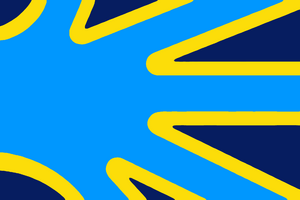Polyashi Sign Language: Difference between revisions
m (Fixed the table) |
m (→Phoneme signs) |
||
| (82 intermediate revisions by the same user not shown) | |||
| Line 1: | Line 1: | ||
{{WIP}} | {{Region icon Anteria}}{{WIP}} | ||
{{Infobox language | {{Infobox language | ||
| name = Polyashi Sign Language (P.S.L.) | | name = Polyashi Sign Language (P.S.L.) | ||
| altname = Lingua gesticulatoria | | altname = Lingua gesticulatoria Pœliacorum (L.G.P.) | ||
| nativename = | | nativename = [[File:Sign language L.svg|30px|link=]][[File:Sign language G.svg|40px|link=]] [[File:LGP_P_outline.png|25px|link=]] | ||
| acceptance = | | acceptance = | ||
| image = ASL_family.jpg | | image = <!--ASL_family.jpg-->Sign_language,_2014_(01).jpg | ||
| imagesize = 350px<!-- or image_size --> | | imagesize = 350px<!-- or image_size --> | ||
| imagealt = | | imagealt = People communicating using the LGP | ||
| imagecaption = People | | imagecaption = People communicating using the LGP | ||
| pronunciation = | | pronunciation = [ɛl d͡ʒiː piː][[File:Speaker Icon.svg|13px|link=http://ipa-reader.xyz/?text=%C9%9Bl%20d%CD%A1%CA%92i%CB%90%20pi%CB%90]] or [ɛl ɡɛː pɛː][[File:Speaker Icon.svg|13px|link=http://ipa-reader.xyz/?text=%C9%9Bl%20%C9%A1%C9%9B%CB%90%20p%C9%9B%CB%90&voice=Ewa]] | ||
| states = Countries influenced by the [[Kento-Polyash languages|Kento-Polyashi culture]] | | states = Countries influenced by the [[Kento-Polyash languages|Kento-Polyashi culture]] | ||
| region = Southern and Southwestern [[Thuadia]] | | region = Southern and Southwestern [[Thuadia]] | ||
| Line 44: | Line 44: | ||
| sign = | | sign = | ||
| posteriori = | | posteriori = | ||
| nation = {{ | | nation = {{Tree list}} | ||
| | <!--*{{flag|Bretislavia}}--> | ||
| | *{{flag|Gabrielland}}{{Hidden begin}} | ||
**Adinnyan Region | |||
***[[File:Arasatian.png|link=|border|23px]] Arasatia | |||
|{{flag| | **North Gabrielland Region | ||
|{{flag|Prei Meas}} | **West Gabrielland Region | ||
*{{flag|Inner Sekidean Union}} | |||
**{{flag|Gadorien}} | |||
|}}{{flag| | **{{flag|Kentalis}} | ||
| | **{{flag|Mustelaria}}{{Hidden begin}} | ||
***{{flag|Monte Blanco}} | |||
***{{flag|Zhousheng}} | |||
**{{flag|Prei Meas}} | |||
**{{flag|Qazhshava}} | |||
**{{flag|Torvon}} | |||
*{{flag|Krenya}} | |||
*{{flag|Speke}} | |||
*{{flag|Tiskaiya}} | |||
*[[File:Triumvirateflag.png|link=|border|23px]] [[Triumvirate|The Triumvirate]]{{Hidden begin}} | |||
**{{flag|Kilowatt}} | |||
**{{flag|Prybourne}} | |||
**{{flag|Velnotia}}{{Tree list/end}} | |||
| minority = | | minority = | ||
| agency = | | agency = | ||
| development_body = | | development_body = | ||
| iso1 = | | iso1 = LGP | ||
| iso1comment = | | iso1comment = | ||
| iso2 = | | iso2 = LGP | ||
| iso2b = | | iso2b = | ||
| iso2t = | | iso2t = | ||
| iso2comment = | | iso2comment = | ||
| iso3 = | | iso3 = LGP | ||
| iso3comment = | | iso3comment = | ||
| lc1 = | | lc1 = | ||
| Line 97: | Line 105: | ||
| lingua_ref = | | lingua_ref = | ||
| ietf = | | ietf = | ||
| map = | | map = LGPDistributionMap.png | ||
| mapsize = | | mapsize = | ||
| mapalt = | | mapalt = | ||
| mapcaption = | | mapcaption = {{align|center|{{legend|#007FFE|Areas where LGP is the official sign language}}}} | ||
| map2 = | | map2 = | ||
| mapalt2 = | | mapalt2 = | ||
| Line 115: | Line 123: | ||
| notice = IPA | | notice = IPA | ||
}} | }} | ||
'''Polyashi Sign Language''', usually called '''LGP''' ([ɛl d͡ʒiː piː] or [ɛl ɡɛː pɛː] in [[wikipedia:International Phonetic Alphabet|IPA]]) as a shortcut of ''"Lingua gesticulatoria | '''Polyashi Sign Language''', usually called '''LGP''' ([ɛl d͡ʒiː piː] or [ɛl ɡɛː pɛː] in [[wikipedia:International Phonetic Alphabet|IPA]], [[File:Sign language L.svg|15px|link=]][[File:Sign language G.svg|20px|link=]] [[File:LGP_P_outline.png|12px|link=]] in [[#Phoneme signs|LGPA]]) as a shortcut of ''"Lingua gesticulatoria Pœliacorum"'' (which is the name in [[wikipedia:Latin|Latin]]), sometimes written in other scripts: ЛГП ([[wikipedia:Cyrillic script|Govoric]]), ⲖⲄⲠ ([[wikipedia:Coptic alphabet|Protopolyash]]), ឯល្គេពេ ([[wikipedia:Khmer script|Preimeai]]) or [[File:BotoEA.png|link=|5px]][[File:BotoLS.png|link=|10px]][[File:BotoGM.png|link=|10px]][[File:Boto&L.png|link=|5px]][[File:BotoPE.png|link=|10px]][[File:Boto&A.png|link=|5px]] ([[Boto script|Boto]]) is a [[wikipedia:Sign language|sign languages]] used by deaf communities in southern and southwestern [[Thuadia]], in general areas influenced by the [[Kento-Polyash languages|Kento-Polyashi culture]]. It is a [[wikipedia:Logogram|logographic]] language with signs for most common [[wikipedia:Phoneme|phonemes]] in local languages for possible spelling of words with no set symbol. | ||
==History== | |||
The origins of the languages are unclear, but it is expected, that the language developed in perpetua as the diverging [[Kento-Polyash languages|Kento-Polyashi tribes]] tried communicating with neighboring cultures, especially [[Mokhavic languages|Mokhavic]] and [[wikipedia:Germanic languages|Germanic]] in the southern [[Thuadia]] and [[wikipedia:Romance languages|Romance]] on the [[Anteria Triumvirate|Canterian peninsula]]. | |||
The first recorded mention of the language comes from present-day [[Zhousheng]], where a local [[Bogmia|Proto-Bogmian]] [[wikipedia:Catholic Church|Catholic]] priest during the times of early [[Kaȝin Christianity|Kaȝin reformation]] complained, that a [[Kaȝin Christianity|Kaȝin]] priest used a sign language among local Tghok populace to spread their belief onto the pagan populace rather than using a language (there was a strong belief in the [[wikipedia:Gift of Tongues|Gift of Tongues]] at that time). | |||
First codified form can be found in present day [[Kentalis]] from 1650, where a community of [[wikipedia:Rusyns|Ereskans]] codified a standart for communication with a local field hospital, where a lot of people were shellshocked and temporairly lost their hearing because of a loud explosion in their proximity. | |||
[[File:Flagofthedeaf.png|thumb|left|{{Hover title|dotted=no|Global Flag for the Deaf Communities on crwflags.com|[https://www.crwflags.com/fotw/flags/int-deaf.html#flag Global Flag for the Deaf Communities]}}]] | |||
The language got international codification only by the mid of 18th century after the establishment of the [[Mustelaria#The Empire of Three Kings|Empire of Three Kings]], where local deaf communities in [[Gadorien|Gadorieni states]], the [[Mustelaria#The Empire of Three Kings|Empire of Three Kings]], western parts of [[Prei Meas]], southern [[Qazhshava]] and [[Speke]] started coordinating in creating a sign lingua france for possible cross-border communication. Although the first codified language was incoherrent to many deaf communities, further changes allowed its development to the extend in which it exists today. | |||
On the 1912 congress (shortly after the [[Great War (Anteria)|Great War]]), communities from 16 countries codified the unified language as the official sign language of their respective countries, which started to be educated on deaf schools. | |||
First country to officially declare the codified LGP as an official sign language was [[Zhengia]] in 1905. | |||
{|class="wikitable sortable" | |||
!Country | |||
!Official | |||
!Cancelled | |||
!Note | |||
|- | |||
|{{flag|Zhengia}} | |||
|style=text-align:center|1905 | |||
|style=text-align:center|1943 | |||
|''Legislation transferred to [[Zhousheng]] | |||
|- | |||
|{{flag|Bogmia}} | |||
|style=text-align:center|1909 | |||
|style=text-align:center|1943 | |||
|''Legislation transferred to [[Zhousheng]] | |||
|- | |||
|{{flag|Gadorien}} | |||
|style=text-align:center|1910 | |||
|style=text-align:center|— | |||
|'' | |||
|- | |||
|{{flag|Kentalis}} | |||
|style=text-align:center|1916 | |||
|style=text-align:center|— | |||
|'' | |||
|- | |||
|{{flag|Krenya}} | |||
|style=text-align:center|1923 | |||
|style=text-align:center|— | |||
|'' | |||
|- | |||
|[[file:PreiMeanNokoriteFlag.png|border|link=|23px]] Colonial [[Prei Meas]] | |||
|style=text-align:center|1924 | |||
|style=text-align:center|1947 | |||
|''Legislation transferred to independent [[Prei Meas]] | |||
|- | |||
|[[file:BorelianKingdomFlag.png|border|link=|23px]] Colonial [[Storvan Autonomy|Storvan]] | |||
|style=text-align:center|1925 | |||
|style=text-align:center|1947 | |||
|''Legislation transferred to independent [[Storvan Autonomy|Storvan]] | |||
|- | |||
|{{flag|Qazhshava}} | |||
|style=text-align:center|1926 | |||
|style=text-align:center|— | |||
|'' | |||
|- | |||
|{{flag|Torvon}} | |||
|style=text-align:center|1932 | |||
|style=text-align:center|— | |||
|'' | |||
|- | |||
|{{flag|Tiskaiya}} | |||
|style=text-align:center|1935 | |||
|style=text-align:center|— | |||
|'' | |||
|- | |||
|{{flag|Zhousheng}} | |||
|style=text-align:center|1943 | |||
|style=text-align:center|2017 | |||
|''Reaffirmation from [[Bogmia]] and [[Zhengia]], legislation transferred to [[Mustelaria]] | |||
|- | |||
|[[file:StorvanFlag.png|border|link=|23px]] [[Storvan Autonomy|Storvan State]] | |||
|style=text-align:center|1947 | |||
|style=text-align:center|1951 | |||
|''Legislation transferred to [[Storvan Autonomy]] via [[Zhousheng]] | |||
|- | |||
|[[File:Triumvirateflag.png|link=|border|23px]] [[Triumvirate|The Triumvirate]] | |||
|style=text-align:center|1948 | |||
|style=text-align:center|— | |||
|'' | |||
|- | |||
|rowspan="2"|{{flag|Prei Meas}} | |||
|style=text-align:center|1951 | |||
|style=text-align:center|1975 | |||
|''Cancelled by the communists during the [[Preimeai civil war|civil war]], reinstated after the war ended | |||
|- | |||
|style=text-align:center|1977 | |||
|style=text-align:center|— | |||
|'' | |||
|- | |||
|{{flag|Monte Blanco}} | |||
|style=text-align:center|1957 | |||
|style=text-align:center|2017 | |||
|''Legislation language transferred to [[Mustelaria]] | |||
|- | |||
|{{flag|Speke}} | |||
|style=text-align:center|1961 | |||
|style=text-align:center|— | |||
|'' | |||
|- | |||
|{{flag|Mustelaria}} | |||
|style=text-align:center|2017 | |||
|style=text-align:center|— | |||
|''Reaffirmation from [[Zhousheng]] and [[Monte Blanco]] | |||
|} | |||
==Introduction== | |||
TBA | |||
==Phoneme signs== | ==Phoneme signs== | ||
{{Infobox writing system | |||
| name = Polyashi Phonetic Manual Alphabet | |||
| altname = LGP Phonetic Alphabet (LGPA)<br>[[File:Sign language L.svg|30px|link=]][[File:Sign language G.svg|40px|link=]] [[File:LGP_P_outline.png|25px|link=]] [[File:Sign_language_A.svg|24px|link=]]<!-- 2ary name --> | |||
| type = Manual<!-- (see type options below) --> | |||
| qid = | |||
<!-- The following three fields, prefixed SH (ShortHand), are used only if the type parameter is set as "shorthand" or "stenography": --> | |||
| SHline = <!-- ("light" or "heavy" - heavy-line shorthands distinguish thick and thin strokes) --> | |||
| SHtype = <!-- (see SHtype options below) --> | |||
| SHform = <!-- (see SHform options below) --> | |||
| typedesc = <!-- (For providing additional info after a general type) --> | |||
| creator = 4th Southern Thuadian Congress of the Deaf (standardization)<!-- (Use instead of famN for artificially created writing systems) --> | |||
| date = ~1810<!-- (Date created) --> | |||
| published = ~1905<!-- (Date published - for shorthands and script reforms) --> | |||
| time = <!-- (Time period during which system was in use) --> | |||
| official script = [[wikipedia:International Phonetic Alphabet|International Phonetic Alphabet]] | |||
| languages = Polyashi Sign Language<!-- (Major languages using the writing system) --> | |||
| fam1 = Polyash sign [[wikipedia:Pidgin|pidgin]]<!-- (Use famN to specify parent writing system/s. --> | |||
| fam2 = <!-- Up to 15 parent writing systems can be listed, | |||
... fam1 being the oldest.) --> | |||
| fam15 = | |||
| print = <!-- (the print basis/model of a braille script} --> | |||
| sisters = <!-- (For sister writing systems here with common origin) --> | |||
| children = <!-- (For child writing systems) --> | |||
| sample = Lengua_de_Signos_(Juan_Pablo_Bonet,_1620)_A.jpg<!-- (Sample image, WITHOUT "Image:" prefix) --> | |||
| imagesize = <!-- (Sample image's size) --> | |||
| caption = Symbol for /a ~ ɑ/ as displayed on a 1905 cover of a book focusing on the topic (in [[wikipedia:Spanish language|Prybournian]])<!-- (Description of sample image) --> | |||
| direction = Time linear | |||
| direction comment = | |||
| unicode = <!-- (To specify a Unicode range) --> | |||
| iso15924 = <!-- (Either the ISO 15924 four-letter code or number. Template will automatically display both) --> | |||
| iso15924 note = <!-- (To specify more text on the ISO 15924 four-letter codes, e.g. variants, aliases) --> | |||
| footnotes = <!-- (Some information about the writing system) --> | |||
| ipa-note = <!-- (set to "none" to cancel IPA warning) --> | |||
}} | |||
There is a special phonetical sign alphabet, called the '''Polyashi Phonetic Manual Alphabet''', or simply referred to as the '''LGPA''', ([ɛl d͡ʒiː piː ɛj] or [ɛl ɡɛː pɛː ɑː] in [[wikipedia:International Phonetic Alphabet|IPA]], [[File:Sign language L.svg|15px|link=]][[File:Sign language G.svg|20px|link=]] [[File:LGP_P_outline.png|12px|link=]] [[File:Sign_language_A.svg|12px|link=]] in [[#Phoneme signs|LGPA]], shortcut for ''Linguæ gesticulatoriarum Pœliacorum Abecedarium''). | |||
The language has special signs for: | The language has special signs for: | ||
*[[wikipedia:Consonant|Consonants]]: /b/, /p/, /t͡s ~ ʈ͡s/, /t͡ʃ ~ t͡ɕ ~ t͡ʂ/, /d͡z ~ ɖ͡z/, /d͡ʒ ~ d͡ʑ ~ d͡ʐ/, /ʃ ~ ɕ ~ ʂ/, /ʒ ~ ʑ ~ ʐ/, /d ~ ɖ/, /t ~ ʈ/, /tʲ~ c/, /dʲ ~ ɟ/, /h ~ ɦ/, /x ~ χ/, /z ~ zʲ/, /s ~ sʲ/, /ð ~ θ/, /ɡ ~ ɢ/, /k/, /q/, /v ~ β/, /f ~ ɸ/, /r ~ ɾ/, /ʀ ~ ɹ ~ ʁ/, /m/, /n/, /ŋ/, /nʲ ~ ɲ/, /l ~ ɫ ~ ʟ/, /ʎ ~ lʲ ~ ȴ/, /ɰ ~ w/, /j ~ ʝ/ | *[[wikipedia:Consonant|Consonants]]: /b/, /p/, /t͡s ~ ʈ͡s/, /t͡ʃ ~ t͡ɕ ~ t͡ʂ/, /d͡z ~ ɖ͡z/, /d͡ʒ ~ d͡ʑ ~ d͡ʐ/, /ʃ ~ ɕ ~ ʂ/, /ʒ ~ ʑ ~ ʐ/, /d ~ ɖ/, /t ~ ʈ/, /tʲ~ c/, /dʲ ~ ɟ/, /h ~ ɦ/, /x ~ χ/, /z ~ zʲ/, /s ~ sʲ/, /ð ~ θ/, /ɡ ~ ɢ/, /k/, /q/, /v ~ β/, /f ~ ɸ/, /r ~ ɾ/, /ʀ ~ ɹ ~ ʁ/, /m/, /n/, /ŋ/, /nʲ ~ ɲ/, /l ~ ɫ ~ ʟ/, /ʎ ~ lʲ ~ ȴ/, /ɰ ~ w/, /j ~ ʝ/ | ||
*[[wikipedia:Vowel|Vowels]]: /a ~ ɑ/, /ɛ ~ e/, /æ ~ ə/, /ɔ ~ o/, /i ~ ɪ/, /ʊ ~ u ~ ʏ/, /ɨ ~ y/, /ø ~ œ/. | *[[wikipedia:Vowel|Vowels]]: /a ~ ɑ/, /ɛ ~ e/, /æ ~ ə ~ ɤ/, /ɔ ~ o/, /i ~ ɪ/, /ʊ ~ u ~ ʏ/, /ɨ ~ y/, /ø ~ œ/ | ||
Which are used for spelling untraditional words, shortcuts, and names, that do not have a classical symbol, or which are not understood by the other speaker. | |||
{| class="wikitable" style="text-align: center;" | {| class="wikitable" style="text-align: center;" | ||
!colspan="10"| | !colspan="10"|Signs for classical [[wikipedia:Phoneme|phonemes]] and numbers | ||
|- | |||
|colspan="10"|All signs can be done with a single hand (in this example right hand, left can be used also) | |||
|- | |||
|style="border-right:1px dashed #A2A9B1; padding:0px; background: #003399;“|[[File:LGP-B.jpg|100px]] | |||
|style="border-left:1px dashed #A2A9B1; padding:0px; background: #003399;“|[[File:LGP-P.jpg|100px]] | |||
|style="border-right:1px dashed #A2A9B1; padding:0px; background: #003399;“|[[File:LGP-D.jpg|100px]] | |||
|style="border-left:1px dashed #A2A9B1; padding:0px; background: #003399;“|[[File:LGP-T.jpg|100px]] | |||
|style="border-right:1px dashed #A2A9B1; padding:0px; background: #003399;“|[[File:LGP-DJ.jpg|100px]] | |||
|style="border-left:1px dashed #A2A9B1; padding:0px; background: #003399;“|[[File:LGP-C.jpg|100px]] | |||
|style="border-right:1px dashed #A2A9B1; padding:0px; background: #003399;“|[[File:LGP-G.jpg|100px]] | |||
|style="border-left:1px dashed #A2A9B1; padding:0px; background: #003399;“|[[File:LGP-K.jpg|100px]] | |||
|style="padding:0px; background: #003399;"|[[File:LGP-Q.jpg|100px]] | |||
|style="padding:0px; background: #003399;"|[[File:LGP-TH.jpg|100px]] | |||
|- | |||
|bgcolor=#F5F5F5 style="border-right:1px dashed #A2A9B1;“|'''/[[wikipedia:Voiced bilabial plosive|b]]/ | |||
|bgcolor=#F5F5F5 style="border-left:1px dashed #A2A9B1;“|'''/[[wikipedia:Voiceless bilabial plosive|p]]/ | |||
|bgcolor=#F5F5F5 style="border-right:1px dashed #A2A9B1;“|'''/[[wikipedia:Voiced dental and alveolar plosives|d]] ~ [[wikipedia:Voiced retroflex plosive|ɖ]]/ | |||
|bgcolor=#F5F5F5 style="border-left:1px dashed #A2A9B1;“|'''/[[wikipedia:Voiceless dental and alveolar plosives|t]] ~ [[wikipedia:Voiceless retroflex plosive|ʈ]]/ | |||
|bgcolor=#F5F5F5 style="border-right:1px dashed #A2A9B1;“|'''/[[wikipedia:Voiced dental and alveolar plosives|d]][[wikipedia:Palatalization (phonetics)|ʲ]] ~ [[wikipedia:Voiced palatal plosive|ɟ]]/ | |||
|bgcolor=#F5F5F5 style="border-left:1px dashed #A2A9B1;“|'''/[[wikipedia:Voiceless dental and alveolar plosives|t]][[wikipedia:Palatalization (phonetics)|ʲ]] ~ [[wikipedia:Voiceless palatal plosive|c]]/ | |||
|bgcolor=#F5F5F5 style="border-right:1px dashed #A2A9B1;“|'''/[[wikipedia:Voiced velar plosive|ɡ]] ~ [[wikipedia:Voiced uvular plosive|ɢ]]/ | |||
|bgcolor=#F5F5F5 style="border-left:1px dashed #A2A9B1;“|'''/[[wikipedia:Voiceless velar plosive|k]]/ | |||
|bgcolor=#F5F5F5|'''/[[wikipedia:Voiceless uvular plosive|q]]/ | |||
|bgcolor=#F5F5F5|'''/[[wikipedia:Voiced dental fricative|ð]] ~ [[wikipedia:Voiceless dental fricative|θ]]/ | |||
|- | |||
|style="padding:0px; background: #003399;"|[[File:LGP-M.jpg|100px]] | |||
|style="padding:0px; background: #003399;"|[[File:LGP-N.jpg|100px]] | |||
|style="padding:0px; background: #003399;"|[[File:LGP-NJ.jpg|100px]] | |||
|style="padding:0px; background: #003399;"|[[File:LGP-NG.jpg|100px]] | |||
|style="padding:0px; background: #003399;"|[[File:LGP-LJ.jpg|100px]] | |||
|style="padding:0px; background: #003399;"|[[File:LGP-L.jpg|100px]] | |||
|style="padding:0px; background: #003399;"|[[File:LGP-RJ.jpg|100px]] | |||
|style="padding:0px; background: #003399;"|[[File:LGP-R.jpg|100px]] | |||
|style="padding:0px; background: #003399;"|[[File:LGP-J.jpg|100px]] | |||
|style="padding:0px; background: #003399;"|[[File:LGP-W.jpg|100px]] | |||
|- | |||
|bgcolor=#F5F5F5|'''/[[wikipedia:Voiced bilabial nasal|m]]/ | |||
|bgcolor=#F5F5F5|'''/[[wikipedia:Voiced dental, alveolar and postalveolar nasals|n]]/ | |||
|bgcolor=#F5F5F5|'''/[[wikipedia:Voiced dental, alveolar and postalveolar nasals|n]][[wikipedia:Palatalization (phonetics)|ʲ]] ~ [[wikipedia:Voiced palatal nasal|ɲ]]/ | |||
|bgcolor=#F5F5F5|'''/[[wikipedia:Voiced velar nasal|ŋ]]/ | |||
|bgcolor=#F5F5F5|'''/[[wikipedia:Voiced palatal lateral approximant|ʎ]] ~ [[wikipedia:Voiced dental, alveolar and postalveolar lateral approximants|l]][[wikipedia:Palatalization (phonetics)|ʲ]] ~ [[wikipedia:Voiced palatal lateral approximant|ȴ]]/ | |||
|bgcolor=#F5F5F5|'''/[[wikipedia:Voiced dental, alveolar and postalveolar lateral approximants|l]] ~ [[wikipedia:Voiced dental, alveolar and postalveolar lateral approximants#Velarized alveolar lateral approximant|ɫ]] ~ [[wikipedia:Voiced velar lateral approximant|ʟ]]/ | |||
|bgcolor=#F5F5F5|'''/[[wikipedia:Voiced uvular trill|ʀ]] ~ [[wikipedia:Voiced alveolar and postalveolar approximants|ɹ]] ~ [[wikipedia:Voiced uvular fricative|ʁ]]/ | |||
|bgcolor=#F5F5F5|'''/[[wikipedia:Voiced dental, alveolar and postalveolar trills|r]] ~ [[wikipedia:Voiced dental and alveolar taps and flaps|ɾ]]/ | |||
|bgcolor=#F5F5F5|'''/[[wikipedia:Voiced palatal approximant|j]] ~ [[wikipedia:Voiced palatal fricative|ʝ]]/ | |||
|bgcolor=#F5F5F5|'''/[[wikipedia:Voiced velar approximant|ɰ]] ~ [[wikipedia:Voiced labialized-velar approximant|w]]/ | |||
|- | |||
|style="border-right:1px dashed #A2A9B1; padding:0px; background: #003399;“|[[File:LGP-DZ.jpg|100px]] | |||
|style="border-left:1px dashed #A2A9B1; padding:0px; background: #003399;“|[[File:LGP-TS.jpg|100px]] | |||
|style="border-right:1px dashed #A2A9B1; padding:0px; background: #003399;“|[[File:LGP-DZX.jpg|100px]] | |||
|style="border-left:1px dashed #A2A9B1; padding:0px; background: #003399;“|[[File:LGP-TSX.jpg|100px]] | |||
|style="border-right:1px dashed #A2A9B1; padding:0px; background: #003399;“|[[File:LGP-Z.jpg|100px]] | |||
|style="border-left:1px dashed #A2A9B1; padding:0px; background: #003399;“|[[File:LGP-S.jpg|100px]] | |||
|style="border-right:1px dashed #A2A9B1; padding:0px; background: #003399;“|[[File:LGP-ZX.jpg|100px]] | |||
|style="border-left:1px dashed #A2A9B1; padding:0px; background: #003399;“|[[File:LGP-SX.jpg|100px]] | |||
|style="border-right:1px dashed #A2A9B1; padding:0px; background: #003399;“|[[File:LGP-V.jpg|100px]] | |||
|style="border-left:1px dashed #A2A9B1; padding:0px; background: #003399;“|[[File:LGP-F.jpg|100px]] | |||
|- | |- | ||
|style="border-right:1px dashed #A2A9B1;“| | |bgcolor=#F5F5F5 style="border-right:1px dashed #A2A9B1;“|'''/[[wikipedia:Voiced alveolar affricate|d͡z]] ~ [[wikipedia:Voiced retroflex plosive|ɖ]]͡[[wikipedia:Voiced alveolar fricative|z]]/ | ||
|style="border-left:1px dashed #A2A9B1;“| | |bgcolor=#F5F5F5 style="border-left:1px dashed #A2A9B1;“|'''/[[wikipedia:Voiceless alveolar affricate|t͡s]] ~ [[wikipedia:Voiceless retroflex plosive|ʈ]]͡[[wikipedia:Voiceless alveolar fricative|s]]/ | ||
|style="border-right:1px dashed #A2A9B1;“| | |bgcolor=#F5F5F5 style="border-right:1px dashed #A2A9B1;“|'''/[[wikipedia:Voiced postalveolar affricate|d͡ʒ]] ~ [[wikipedia:Voiced alveolo-palatal affricate|d͡ʑ]]<!-- ~ d͡ʐ-->/ | ||
|style="border-left:1px dashed #A2A9B1;“| | |bgcolor=#F5F5F5 style="border-left:1px dashed #A2A9B1;“|'''/[[wikipedia:Voiceless postalveolar affricate|t͡ʃ]] ~ [[wikipedia:Voiceless alveolo-palatal affricate|t͡ɕ]]<!-- ~ t͡ʂ-->/ | ||
|style="border-right:1px dashed #A2A9B1;“| | |bgcolor=#F5F5F5 style="border-right:1px dashed #A2A9B1;“|'''/[[wikipedia:Voiced alveolar fricative|z]] ~ [[wikipedia:Voiced alveolar fricative|z]][[wikipedia:Palatalization (phonetics)|ʲ]]/ | ||
|style="border-left:1px dashed #A2A9B1;“| | |bgcolor=#F5F5F5 style="border-left:1px dashed #A2A9B1;“|'''/[[wikipedia:Voiceless alveolar fricative|s]] ~ [[wikipedia:Voiceless alveolar fricative|s]][[wikipedia:Palatalization (phonetics)|ʲ]]/ | ||
|style="border-right:1px dashed #A2A9B1;“| | |bgcolor=#F5F5F5 style="border-right:1px dashed #A2A9B1;“|'''/[[wikipedia:Voiced postalveolar fricative|ʒ]] ~ [[wikipedia:Voiced alveolo-palatal fricative|ʑ]] ~ [[wikipedia:Voiced retroflex fricative|ʐ]]/ | ||
|style="border-left:1px dashed #A2A9B1;“| | |bgcolor=#F5F5F5 style="border-left:1px dashed #A2A9B1;“|'''/[[wikipedia:Voiceless postalveolar fricative|ʃ]] ~ [[wikipedia:Voiceless alveolo-palatal fricative|ɕ]] ~ [[wikipedia:Voiceless retroflex fricative|ʂ]]/ | ||
| | |bgcolor=#F5F5F5 style="border-right:1px dashed #A2A9B1;“|'''/[[wikipedia:Voiced labiodental fricative|v]] ~ [[wikipedia:Voiced bilabial fricative|β]]/ | ||
| | |bgcolor=#F5F5F5 style="border-left:1px dashed #A2A9B1;“|'''/[[wikipedia:Voiceless labiodental fricative|f]] ~ [[wikipedia:Voiceless bilabial fricative|ɸ]]/ | ||
|- | |- | ||
| | |style="padding:0px; background: #003399;"|[[File:LGP-H.jpg|100px]] | ||
| | |style="padding:0px; background: #003399;"|[[File:LGP-X.jpg|100px]] | ||
| | |style="padding:0px; background: #003399;"|[[File:LGP-A.jpg|100px]] | ||
| | |style="padding:0px; background: #003399;"|[[File:LGP-E.jpg|100px]] | ||
| | |style="padding:0px; background: #003399;"|[[File:LGP-AE.jpg|100px]] | ||
| | |style="padding:0px; background: #003399;"|[[File:LGP-O.jpg|100px]] | ||
| | |style="padding:0px; background: #003399;"|[[File:LGP-I.jpg|100px]] | ||
| | |style="padding:0px; background: #003399;"|[[File:LGP-U.jpg|100px]] | ||
| | |style="padding:0px; background: #003399;"|[[File:LGP-Y.jpg|100px]] | ||
| | |style="padding:0px; background: #003399;"|[[File:LGP-OE.jpg|100px]] | ||
|- | |- | ||
| | |bgcolor=#F5F5F5|'''/[[wikipedia:Voiceless glottal fricative|h]] ~ [[wikipedia:Voiced glottal fricative|ɦ]]/ | ||
| | |bgcolor=#F5F5F5|'''/[[wikipedia:Voiceless velar fricative|x]] ~ [[wikipedia:Voiceless uvular fricative|χ]]/ | ||
| | |bgcolor=#F5F5F5|'''/[[wikipedia:Open front unrounded vowel|a]] ~ [[wikipedia:Open back unrounded vowel|ɑ]] ~ [[wikipedia:Open back rounded vowel|ɒ]]/ | ||
| | |bgcolor=#F5F5F5|'''/[[wikipedia:Open-mid front unrounded vowel|ɛ]] ~ [[wikipedia:Close-mid front unrounded vowel|e]]/ | ||
| | |bgcolor=#F5F5F5|'''/[[wikipedia:Near-open front unrounded vowel|æ]] ~ [[wikipedia:Mid central vowel|ə]] ~ [[wikipedia:Close-mid back unrounded vowel|ɤ]]/ | ||
| | |bgcolor=#F5F5F5|'''/[[wikipedia:Open-mid back rounded vowel|ɔ]] ~ [[wikipedia:Close-mid back rounded vowel|o]]/ | ||
| | |bgcolor=#F5F5F5|'''/[[wikipedia:Close front unrounded vowel|i]] ~ [[wikipedia:Near-close near-front unrounded vowel|ɪ]]/ | ||
| | |bgcolor=#F5F5F5|'''/[[wikipedia:Near-close near-back rounded vowel|ʊ]] ~ [[wikipedia:Close back rounded vowel|u]] ~ [[wikipedia:Near-close near-front rounded vowel|ʏ]]/ | ||
| | |bgcolor=#F5F5F5|'''/[[wikipedia:Close central unrounded vowel|ɨ]] ~ [[wikipedia:Close front rounded vowel|y]]/ | ||
| | |bgcolor=#F5F5F5|'''/[[wikipedia:Close-mid front rounded vowel|ø]] ~ [[wikipedia:Open-mid front rounded vowel|œ]]/ | ||
|- | |- | ||
| | |style="padding:0px; background: #003399;"|[[File:LGP-1.jpg|100px]] | ||
| | |style="padding:0px; background: #003399;"|[[File:LGP-2.jpg|100px]] | ||
| | |style="padding:0px; background: #003399;"|[[File:LGP-3.jpg|100px]] | ||
| | |style="padding:0px; background: #003399;"|[[File:LGP-4.jpg|100px]] | ||
| | |style="padding:0px; background: #003399;"|[[File:LGP-5.jpg|100px]] | ||
| | |style="padding:0px; background: #003399;"|[[File:LGP-6.jpg|100px]] | ||
| | |style="padding:0px; background: #003399;"|[[File:LGP-7.jpg|100px]] | ||
| | |style="padding:0px; background: #003399;"|[[File:LGP-8.jpg|100px]] | ||
| | |style="padding:0px; background: #003399;"|[[File:LGP-9.jpg|100px]] | ||
| | |style="padding:0px; background: #003399;"|[[File:LGP-0.jpg|100px]] | ||
|- | |- | ||
| | |bgcolor=#F5F5F5|'''1 | ||
| | |bgcolor=#F5F5F5|'''2 | ||
| | |bgcolor=#F5F5F5|'''3 | ||
| | |bgcolor=#F5F5F5|'''4 | ||
| | |bgcolor=#F5F5F5|'''5 | ||
| | |bgcolor=#F5F5F5|'''6 | ||
| | |bgcolor=#F5F5F5|'''7 | ||
| | |bgcolor=#F5F5F5|'''8 | ||
| | |bgcolor=#F5F5F5|'''9 | ||
|style=" | |bgcolor=#F5F5F5|'''0 ~ 10 | ||
|} | |||
This alphabet is of course linked to the language of origin of the speaker and can be realistically used only in communication between two people of the same nationality. | |||
==Pronouns== | |||
<!--The language still has preserved remnants of [[wikipedia:Dual (grammatical number)|dual]] in the form of strictly [[wikipedia:Clusivity|inclusive]] we (That is "I and you, but not anybody else"), which is considered to be the 5th person plural (4th person is exclusive we)--> | |||
The language uses the 4th person in plural for the [[wikipedia:Clusivity|exclusive]] we. | |||
{| class="wikitable" style="text-align: center;" | |||
!rowspan="2"|Figure !!colspan="3"|Includes !!rowspan="2"|Name | |||
|- | |- | ||
| | !Speaker !!Listener !!Others | ||
| | |- | ||
| | !''0th Person'' | ||
| | |style="background:#EF4040"|<span style="color: #A80000">'''NO'''</span> | ||
| | |style="background:#EF4040"|<span style="color: #A80000">'''NO'''</span> | ||
| | |style="background:#EF4040"|<span style="color: #A80000">'''NO'''</span> | ||
| | |Nobody | ||
| | |- | ||
| | !rowspan="3"|1st person | ||
| | |style="background:#74FF60"|<span style="color: #108000">'''YES'''</span> | ||
|style="background:#EF4040"|<span style="color: #A80000">'''NO'''</span> | |||
|style="background:#EF4040"|<span style="color: #A80000">'''NO'''</span> | |||
|I | |||
|- | |||
|style="background:#74FF60"|<span style="color: #108000">'''YES'''</span> | |||
|style="background:#74FF60"|<span style="color: #108000">'''YES'''</span> | |||
|style="background:#74FF60"|<span style="color: #108000">'''YES'''</span> | |||
|rowspan="2"|We ([[wikipedia:Clusivity|inclus.]]) | |||
|- | |||
|style="background:#74FF60"|<span style="color: #108000">'''YES'''</span> | |||
|style="background:#74FF60"|<span style="color: #108000">'''YES'''</span> | |||
|style="background:#EF4040"|<span style="color: #A80000">'''NO'''</span> | |||
|- | |||
!rowspan="2"|2nd person | |||
|style="background:#EF4040"|<span style="color: #A80000">'''NO'''</span> | |||
|style="background:#74FF60"|<span style="color: #108000">'''YES'''</span> | |||
|style="background:#EF4040"|<span style="color: #A80000">'''NO'''</span> | |||
|You (sg.) | |||
|- | |||
|style="background:#EF4040"|<span style="color: #A80000">'''NO'''</span> | |||
|style="background:#74FF60"|<span style="color: #108000">'''YES'''</span> | |||
|style="background:#74FF60"|<span style="color: #108000">'''YES'''</span> | |||
|You (pl.) | |||
|- | |||
!3rd person | |||
|style="background:#EF4040"|<span style="color: #A80000">'''NO'''</span> | |||
|style="background:#EF4040"|<span style="color: #A80000">'''NO'''</span> | |||
|style="background:#74FF60"|<span style="color: #108000">'''YES'''</span> | |||
|He/She/It/They | |||
|- | |||
!4th person | |||
|style="background:#74FF60"|<span style="color: #108000">'''YES'''</span> | |||
|style="background:#EF4040"|<span style="color: #A80000">'''NO'''</span> | |||
|style="background:#74FF60"|<span style="color: #108000">'''YES'''</span> | |||
|We ([[wikipedia:Clusivity|exclus.]]) | |||
|- | |||
<!--!5th person | |||
|style="background:#74FF60"|<span style="color: #108000">'''YES'''</span> | |||
|style="background:#74FF60"|<span style="color: #108000">'''YES'''</span> | |||
|style="background:#EF4040"|<span style="color: #A80000">'''NO'''</span> | |||
|We ([[wikipedia:Clusivity|str. incl.]])--> | |||
|} | |||
{| class="wikitable" style="text-align: center;" | |||
!colspan="3"|Singular !!colspan="4"|Plural !!colspan="5"|Other | |||
|- | |||
!I !!You !!They !!We (incl.) !!You !!They !!We (excl.) <!--!!We (str. in.) -->!!None !!Every !!Any !!Some !!Who | |||
|- | |||
|[[File:LGP-1sg.jpg|100px]] | |||
|[[File:LGP-2sg.jpg|100px]] | |||
|[[File:LGP-3sg.jpg|100px]] | |||
|[[File:LGP-1pl.jpg|100px]] | |||
|[[File:LGP-2pl.jpg|100px]] | |||
|[[File:LGP-3pl.jpg|100px]] | |||
|[[File:LGP-4pl.jpg|100px]] | |||
<!--|[[File:LGP-5pl.jpg|100px]]--> | |||
|[[File:LGP-noper.jpg|100px]] | |||
|[[File:LGP-allper.jpg|100px]] | |||
|[[File:LGP-sbper.jpg|100px]] | |||
|[[File:LGP-anyper.jpg|100px]] | |||
|[[File:LGP-whoper.jpg|100px]] | |||
|- | |||
|bgcolor=#F5F5F5|'''1.sg ||bgcolor=#F5F5F5|'''2.sg ||bgcolor=#F5F5F5|'''3.sg ||bgcolor=#F5F5F5|'''1.pl ||bgcolor=#F5F5F5|'''2.pl ||bgcolor=#F5F5F5|'''3.pl ||bgcolor=#F5F5F5|'''4.pl ||bgcolor=#F5F5F5|'''A.sg ||bgcolor=#F5F5F5|'''A.pl ||bgcolor=#F5F5F5|'''?.sg ||bgcolor=#F5F5F5|'''?.pl ||bgcolor=#F5F5F5|'''Ques. <!--||bgcolor=#F5F5F5|'''5.pl--> | |||
|} | |||
{| class="wikitable" style="text-align: center;" | |||
!colspan="2" rowspan="2"|[[wikipedia:Clusivity|Clusivity]] chart !!colspan="2"|Does it include the listener? | |||
|- | |- | ||
!YES !!NO | |||
|- | |- | ||
!rowspan="2"|Does it include<br>the speaker? | |||
!YES | |||
|Inclusive We ||Exclusive We | |||
| | |||
| | |||
|- | |- | ||
!NO | |||
| | |You ||They | ||
| | |||
|} | |} | ||
==Word Order== | |||
The LGP has a heavily controlled [[wikipedia:Word order|word order]], which works as following: | |||
[[wikipedia:Grammatical modifier|MODIFIERS]] — <small>''Further adverbials''</small> — <big>'''[[wikipedia:Subject (grammar)|SUBJECT]]'''</big> — [[wikipedia:Adverbial|ADVERBIALS]] — POSSIBLE NEGATION — <big>'''[[wikipedia:Predicate (grammar)|PREDICATE]]'''</big> — POSSIBLE QUESTION — <small>''Object modifiers''</small> — [[wikipedia:Object (grammar)|OBJECTS]] | |||
For example, the [[wikipedia:Pangram|pangram]] "The quick brown fox jumps over a lazy dog" would have the order of "Quick - brown - fox - to jump - lazy - over dog" | |||
If we were to modify the sentence to "The very quick light brown fox doesn't steadily jump over a somewhat lazy dog", we would have to follow the word order to: "Quick - very - brown - light - fox - to jump - steadily - not - lazy - somewhat - over dog" | |||
{{Template:Anteria languages navbox}} | |||
{{Template:Anteria info pages}} | |||
[[Category:Languages in Anteria]] | |||
[[Category:Anteria]] | |||
[[Category:Kento-Polyash languages]] | |||
Latest revision as of 11:43, 7 August 2021
This article is incomplete because it is pending further input from participants, or it is a work-in-progress by one author. Please comment on this article's talk page to share your input, comments and questions. Note: To contribute to this article, you may need to seek help from the author(s) of this page. |
| Polyashi Sign Language (P.S.L.) | |
|---|---|
| Lingua gesticulatoria Pœliacorum (L.G.P.) | |
 People communicating using the LGP | |
| Pronunciation | [ɛl d͡ʒiː piː] |
| Native to | Countries influenced by the Kento-Polyashi culture |
| Region | Southern and Southwestern Thuadia |
Native speakers | L1: ~3,000,000 L2: ~2,500,000 FL: ~5,000,000 |
| Official status | |
Official language in |
|
| Language codes | |
| ISO 639-1 | LGP |
| ISO 639-2 | LGP |
| ISO 639-3 | LGP |
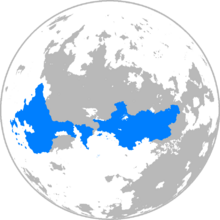 Areas where LGP is the official sign language | |
Polyashi Sign Language, usually called LGP ([ɛl d͡ʒiː piː] or [ɛl ɡɛː pɛː] in IPA,
![]() in LGPA) as a shortcut of "Lingua gesticulatoria Pœliacorum" (which is the name in Latin), sometimes written in other scripts: ЛГП (Govoric), ⲖⲄⲠ (Protopolyash), ឯល្គេពេ (Preimeai) or
in LGPA) as a shortcut of "Lingua gesticulatoria Pœliacorum" (which is the name in Latin), sometimes written in other scripts: ЛГП (Govoric), ⲖⲄⲠ (Protopolyash), ឯល្គេពេ (Preimeai) or ![]()
![]()
![]()
![]() File:BotoPE.png
File:BotoPE.png![]() (Boto) is a sign languages used by deaf communities in southern and southwestern Thuadia, in general areas influenced by the Kento-Polyashi culture. It is a logographic language with signs for most common phonemes in local languages for possible spelling of words with no set symbol.
(Boto) is a sign languages used by deaf communities in southern and southwestern Thuadia, in general areas influenced by the Kento-Polyashi culture. It is a logographic language with signs for most common phonemes in local languages for possible spelling of words with no set symbol.
History
The origins of the languages are unclear, but it is expected, that the language developed in perpetua as the diverging Kento-Polyashi tribes tried communicating with neighboring cultures, especially Mokhavic and Germanic in the southern Thuadia and Romance on the Canterian peninsula.
The first recorded mention of the language comes from present-day Zhousheng, where a local Proto-Bogmian Catholic priest during the times of early Kaȝin reformation complained, that a Kaȝin priest used a sign language among local Tghok populace to spread their belief onto the pagan populace rather than using a language (there was a strong belief in the Gift of Tongues at that time).
First codified form can be found in present day Kentalis from 1650, where a community of Ereskans codified a standart for communication with a local field hospital, where a lot of people were shellshocked and temporairly lost their hearing because of a loud explosion in their proximity.
The language got international codification only by the mid of 18th century after the establishment of the Empire of Three Kings, where local deaf communities in Gadorieni states, the Empire of Three Kings, western parts of Prei Meas, southern Qazhshava and Speke started coordinating in creating a sign lingua france for possible cross-border communication. Although the first codified language was incoherrent to many deaf communities, further changes allowed its development to the extend in which it exists today.
On the 1912 congress (shortly after the Great War), communities from 16 countries codified the unified language as the official sign language of their respective countries, which started to be educated on deaf schools.
First country to officially declare the codified LGP as an official sign language was Zhengia in 1905.
| Country | Official | Cancelled | Note |
|---|---|---|---|
| 1905 | 1943 | Legislation transferred to Zhousheng | |
| 1909 | 1943 | Legislation transferred to Zhousheng | |
| 1910 | — | ||
| 1916 | — | ||
| 1923 | — | ||
| 1924 | 1947 | Legislation transferred to independent Prei Meas | |
| 1925 | 1947 | Legislation transferred to independent Storvan | |
| 1926 | — | ||
| 1932 | — | ||
| 1935 | — | ||
| 1943 | 2017 | Reaffirmation from Bogmia and Zhengia, legislation transferred to Mustelaria | |
| 1947 | 1951 | Legislation transferred to Storvan Autonomy via Zhousheng | |
| 1948 | — | ||
| 1951 | 1975 | Cancelled by the communists during the civil war, reinstated after the war ended | |
| 1977 | — | ||
| 1957 | 2017 | Legislation language transferred to Mustelaria | |
| 1961 | — | ||
| 2017 | — | Reaffirmation from Zhousheng and Monte Blanco |
Introduction
TBA
Phoneme signs
| Polyashi Phonetic Manual Alphabet LGP Phonetic Alphabet (LGPA) | |
|---|---|
 Symbol for /a ~ ɑ/ as displayed on a 1905 cover of a book focusing on the topic (in Prybournian) | |
| Type | Manual
|
| Languages | Polyashi Sign Language |
| Creator | 4th Southern Thuadian Congress of the Deaf (standardization) |
| Created | ~1810 |
| Published | ~1905
|
Parent systems | Polyash sign pidgin
|
There is a special phonetical sign alphabet, called the Polyashi Phonetic Manual Alphabet, or simply referred to as the LGPA, ([ɛl d͡ʒiː piː ɛj] or [ɛl ɡɛː pɛː ɑː] in IPA,
![]()
in LGPA, shortcut for Linguæ gesticulatoriarum Pœliacorum Abecedarium).
The language has special signs for:
- Consonants: /b/, /p/, /t͡s ~ ʈ͡s/, /t͡ʃ ~ t͡ɕ ~ t͡ʂ/, /d͡z ~ ɖ͡z/, /d͡ʒ ~ d͡ʑ ~ d͡ʐ/, /ʃ ~ ɕ ~ ʂ/, /ʒ ~ ʑ ~ ʐ/, /d ~ ɖ/, /t ~ ʈ/, /tʲ~ c/, /dʲ ~ ɟ/, /h ~ ɦ/, /x ~ χ/, /z ~ zʲ/, /s ~ sʲ/, /ð ~ θ/, /ɡ ~ ɢ/, /k/, /q/, /v ~ β/, /f ~ ɸ/, /r ~ ɾ/, /ʀ ~ ɹ ~ ʁ/, /m/, /n/, /ŋ/, /nʲ ~ ɲ/, /l ~ ɫ ~ ʟ/, /ʎ ~ lʲ ~ ȴ/, /ɰ ~ w/, /j ~ ʝ/
- Vowels: /a ~ ɑ/, /ɛ ~ e/, /æ ~ ə ~ ɤ/, /ɔ ~ o/, /i ~ ɪ/, /ʊ ~ u ~ ʏ/, /ɨ ~ y/, /ø ~ œ/
Which are used for spelling untraditional words, shortcuts, and names, that do not have a classical symbol, or which are not understood by the other speaker.
| Signs for classical phonemes and numbers | |||||||||
|---|---|---|---|---|---|---|---|---|---|
| All signs can be done with a single hand (in this example right hand, left can be used also) | |||||||||
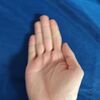
|
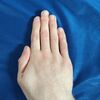
|
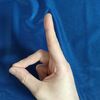
|
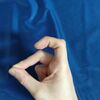
|
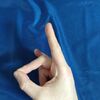
|
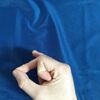
|
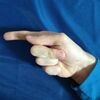
|

|

|
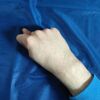
|
| /b/ | /p/ | /d ~ ɖ/ | /t ~ ʈ/ | /dʲ ~ ɟ/ | /tʲ ~ c/ | /ɡ ~ ɢ/ | /k/ | /q/ | /ð ~ θ/ |
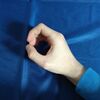
|
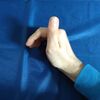
|
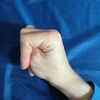
|

|

|
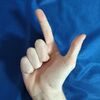
|
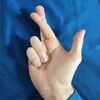
|
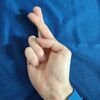
|
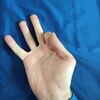
|
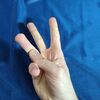
|
| /m/ | /n/ | /nʲ ~ ɲ/ | /ŋ/ | /ʎ ~ lʲ ~ ȴ/ | /l ~ ɫ ~ ʟ/ | /ʀ ~ ɹ ~ ʁ/ | /r ~ ɾ/ | /j ~ ʝ/ | /ɰ ~ w/ |
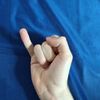
|
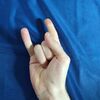
|
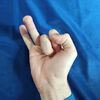
|
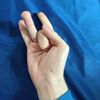
|

|

|
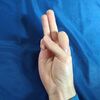
|
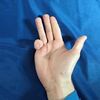
|
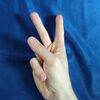
|
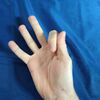
|
| /d͡z ~ ɖ͡z/ | /t͡s ~ ʈ͡s/ | /d͡ʒ ~ d͡ʑ/ | /t͡ʃ ~ t͡ɕ/ | /z ~ zʲ/ | /s ~ sʲ/ | /ʒ ~ ʑ ~ ʐ/ | /ʃ ~ ɕ ~ ʂ/ | /v ~ β/ | /f ~ ɸ/ |
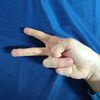
|
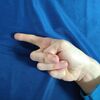
|
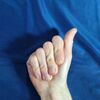
|
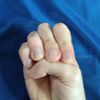
|
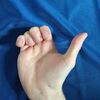
|
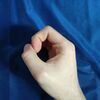
|
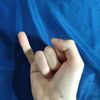
|
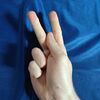
|
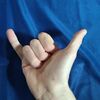
|
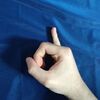
|
| /h ~ ɦ/ | /x ~ χ/ | /a ~ ɑ ~ ɒ/ | /ɛ ~ e/ | /æ ~ ə ~ ɤ/ | /ɔ ~ o/ | /i ~ ɪ/ | /ʊ ~ u ~ ʏ/ | /ɨ ~ y/ | /ø ~ œ/ |
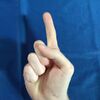
|

|
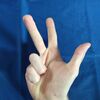
|
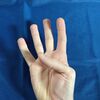
|
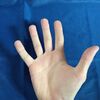
|
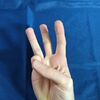
|
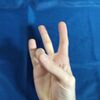
|
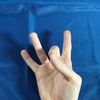
|
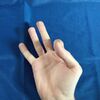
|

|
| 1 | 2 | 3 | 4 | 5 | 6 | 7 | 8 | 9 | 0 ~ 10 |
This alphabet is of course linked to the language of origin of the speaker and can be realistically used only in communication between two people of the same nationality.
Pronouns
The language uses the 4th person in plural for the exclusive we.
| Figure | Includes | Name | ||
|---|---|---|---|---|
| Speaker | Listener | Others | ||
| 0th Person | NO | NO | NO | Nobody |
| 1st person | YES | NO | NO | I |
| YES | YES | YES | We (inclus.) | |
| YES | YES | NO | ||
| 2nd person | NO | YES | NO | You (sg.) |
| NO | YES | YES | You (pl.) | |
| 3rd person | NO | NO | YES | He/She/It/They |
| 4th person | YES | NO | YES | We (exclus.) |
| Singular | Plural | Other | |||||||||
|---|---|---|---|---|---|---|---|---|---|---|---|
| I | You | They | We (incl.) | You | They | We (excl.) | None | Every | Any | Some | Who |
| File:LGP-1sg.jpg | File:LGP-2sg.jpg | File:LGP-3sg.jpg | File:LGP-1pl.jpg | File:LGP-2pl.jpg | File:LGP-3pl.jpg | File:LGP-4pl.jpg | File:LGP-noper.jpg | File:LGP-allper.jpg | File:LGP-sbper.jpg | File:LGP-anyper.jpg | File:LGP-whoper.jpg |
| 1.sg | 2.sg | 3.sg | 1.pl | 2.pl | 3.pl | 4.pl | A.sg | A.pl | ?.sg | ?.pl | Ques. |
| Clusivity chart | Does it include the listener? | ||
|---|---|---|---|
| YES | NO | ||
| Does it include the speaker? |
YES | Inclusive We | Exclusive We |
| NO | You | They | |
Word Order
The LGP has a heavily controlled word order, which works as following:
MODIFIERS — Further adverbials — SUBJECT — ADVERBIALS — POSSIBLE NEGATION — PREDICATE — POSSIBLE QUESTION — Object modifiers — OBJECTS
For example, the pangram "The quick brown fox jumps over a lazy dog" would have the order of "Quick - brown - fox - to jump - lazy - over dog"
If we were to modify the sentence to "The very quick light brown fox doesn't steadily jump over a somewhat lazy dog", we would have to follow the word order to: "Quick - very - brown - light - fox - to jump - steadily - not - lazy - somewhat - over dog"
